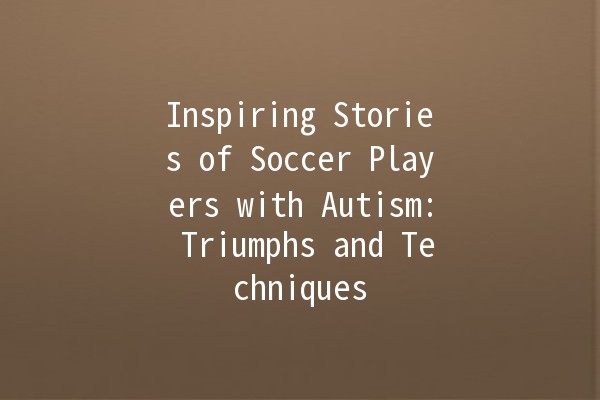Soccer, often referred to as football outside of North America, is not just a sport; it is a community where individuals can express themselves, build friendships, and foster a sense of belonging. Among the vibrant tapestry of athletes are soccer players with autism, who demonstrate remarkable resilience and talent on and off the field. This article celebrates these individuals, exploring their journeys, the challenges they face, and some practical techniques for enhancing performance and productivity for players on the autism spectrum.
Understanding Autism in Soccer
Autism Spectrum Disorder (ASD) is a neurodevelopmental condition characterized by challenges with social skills, repetitive behaviors, and communication difficulties. In the realm of sports, players with autism can display unique strengths, such as enhanced focus on the game and exceptional visual skills. Soccer provides an excellent platform for individuals with ASD to showcase their skills, find a sense of community, and enjoy the thrill of competition.
The Benefits of Soccer for Players with Autism

Success Stories of Soccer Players with Autism
Jake Thomas, a young soccer player diagnosed with autism at a young age, quickly found soccer to be his passion. With the support of his parents and coaches, Jake honed his skills through local leagues. His dedication paid off when he earned a spot on a traveling soccer team. Jake’s story inspires many; he advocates for inclusion in sports, emphasizing that players with autism can achieve greatness when provided with the right support and opportunities.
Emily Seres became wellknown in her community not just for her incredible dribbling skills but for her determination and positive attitude. Having faced challenges with communication, Emily found that soccer allowed her to express herself in ways words could not. Her success in soccer led her to mentor younger players with autism, demonstrating the power of sports in building confidence and friendships.
Technique #1: Focus on Strengths
One of the key techniques for supporting players with autism in soccer is to focus on their strengths. Coaches and parents should identify specific skills—whether it's speed, agility, or strategic thinking—and tailor practice sessions around these strengths.
Example:
Technique #2: Create a Supportive Environment
A positive, inclusive environment can significantly impact the selfesteem and performance of soccer players with autism. Coaches should foster an atmosphere of acceptance, patience, and encouragement.
Example:
Technique #3: Use Visual Supports
Visual aids can enhance learning and retention for players with autism. Incorporating diagrams, charts, and visual schedules into practice helps reinforce concepts in a way that resonates with players.
Example: Create visual playbooks that outline formations and set pieces, allowing players to visualize their roles during a game.
Technique #4: Set Clear Goals
Goal setting is a crucial aspect of development in sports. Setting clear, achievable goals gives players with autism direction and purpose. These goals should be specific, measurable, and timebound.
Example: Instead of a vague goal like "improve shooting," specify "practice shooting for 30 minutes every Tuesday."
Technique #5: Incorporate Routine into Practice
Players with autism often thrive with established routines. Designing practices that follow a consistent structure can help players feel more comfortable and engaged.
Example:
Encouraging Interaction and Engagement
As soccer players with autism navigate their unique challenges, it’s essential for coaches, fellow players, and families to foster an atmosphere where inclusion and support reign. This encourages players to engage more with their teammates, helping them grow both personally and athletically.
Frequently Asked Questions (FAQ)
Soccer players with autism may encounter various challenges, including difficulties with social interaction, communication, understanding nonverbal cues, and sensory sensitivities. It is vital for coaches and teammates to be aware of these challenges and work together to create a supportive environment.
Coaches should use clear, concise language and incorporate visual aids to enhance understanding. Additionally, employing positive reinforcement can help motivate and engage players in learning new skills and strategies.
Training techniques that focus on individual strengths, incorporate routine, and provide visual supports tend to be most effective. Tailoring practices to emphasize areas where players excel can boost confidence and performance.
Families can support their children by fostering a sense of interest in soccer through attendance at games, encouraging participation in camps, and being actively involved in practice sessions. Additionally, maintaining open communication helps families stay informed about their child’s progress.
Teamwork is crucial for personal and athletic development. It helps players learn to communicate, collaborate, and develop friendships—skills that are beneficial both on and off the field. Being part of a team can significantly enhance a player's sense of belonging and selfworth.
Yes, soccer can be instrumental in the holistic development of children with autism. It promotes physical fitness, mental resilience, social skills, and emotional wellbeing, creating a wellrounded experience that encourages growth in multiple domains.
Inspiring stories of soccer players with autism show us that with dedication, the right techniques, and solid support systems, the beautiful game can become a pathway to achievement and joy. Through tailored practices and creating a welcoming environment, we can continue to uplift and celebrate these remarkable athletes. Embracing diversity in sports not only benefits the players but enriches the soccer community as a whole.